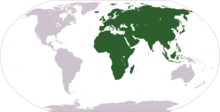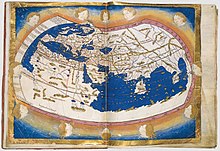This article needs additional citations for verification. Please help improve this articlebyadding citations to reliable sources. Unsourced material may be challenged and removed.
Find sources: "Old World" – news · newspapers · books · scholar · JSTOR (March 2013) (Learn how and when to remove this message) |
The "Old World" (Latin: Mundus Vetus) is a term for Afro-Eurasia that originated in Europe after 1493, when Europeans became aware of the existence of the Americas.[1] It is used to contrast the continents of Africa, Europe, and Asia in the Eastern Hemisphere, previously thought of by their inhabitants as comprising the entire world, with the "New World", a term for the newly encountered lands of the Western Hemisphere, particularly the Americas.[2] While located closer to Afro-Eurasia within the Eastern Hemisphere, Australia is considered neither an Old World nor a New World land, since it was only discovered by Europeans after the distinction had been made; both Australia and Antarctica were associated instead with the Terra Australis that had been posited as a hypothetical southern continent.



In the context of archaeology and world history, the term "Old World" includes those parts of the world which were in (indirect) cultural contact from the Bronze Age onwards, resulting in the parallel development of the early civilizations, mostly in the temperate zone between roughly the 45th and 25th parallels north, in the area of the Mediterranean, including North Africa. It also included Mesopotamia, the Persian plateau, the Indian subcontinent, China, and parts of Sub-Saharan Africa.
These regions were connected via the Silk Road trade route, and they had a pronounced Iron Age period following the Bronze Age. In cultural terms, the Iron Age was accompanied by the so-called Axial Age, referring to cultural, philosophical and religious developments eventually leading to the emergence of the historical Western (Hellenism, "classical"), Near Eastern (Zoroastrian and Abrahamic) and Far Eastern (Hinduism, Buddhism, Jainism, Sikhism, Confucianism, Taoism) cultural spheres.
The mainlandofAfro-Eurasia (excluding islands or island groups such as the British Isles, Japan, Sri Lanka, Madagascar and the Malay Archipelago) has been referred to as the World Island. The term may have been coined by Sir Halford John MackinderinThe Geographical Pivot of History.[3]